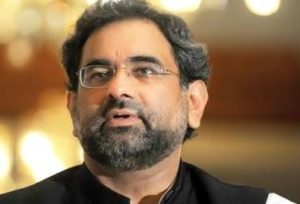Pakistan’s new Prime Minister Shahid Khaqan Abbasi has set himself a possibly insurmountable challenge: He intends to work with India to achieve peace across South Asia. Those are good intentions on the face of it, but can Abbasi walk the talk?

Some media analysts say it is likely to be a tall order for Mr Abbasi, considering that the two nuclear-armed nations have not had high-level dialogue for almost two years. Given the’institutional opposition’ of Pakistan’s military against reconciliation with India, which has fought three wars with its larger neighbour since independence from British colonial rule in 1947, things look bleak.
Tensions have remained high since January 2016 when Pakistan-based insurgents attacked an Indian airbase near the border, derailing scheduled talks between the two countries.
A second raid by militants on an army camp in Kashmir last year prompted Indian Prime Minister Narendra Modi to order an offensive on the Pakistan-controlled part of the disputed region and destroy camps it said were hosting terrorists.
“We intend to work with them to achieve stability in the region,” Mr Abbasi, who took office three weeks ago, said in an interview. “We will try to work with India, but they have not reciprocated as they should have.”
Mr Abbasi denied that militants are allowed to operate in the country, and Pakistan said it provides only ‘moral support’ to people in Muslim-majority Kashmir, which is claimed in totality by both nations.
Mr Abbasi said: “Pakistan is going to deal with India on a bilateral basis and on equal footing.”
With Pakistanis heading to the polls next year, his comments are not “really likely to be taken seriously in Delhi because Modi isn’t going to expend political capital with Pakistan when we don’t know who will be in power after the election”, said Mr Pratyush Rao, a senior Singapore-based analyst at consultancy Control Risks.
Along with border flare-ups, United States President Donald Trump’s talk last week of getting India more involved in Afghanistan plays on one of the great fears of Pakistan’s military establishment: that the neighbours to the east and west will gang up against South Asia’s second-largest economy.
India’s Foreign Ministry declined to comment, though the government has previously said it will not hold talks until Pakistan stops its policy of supporting groups that launch cross-border attacks.
Afghanistan’s government welcomes any attempt by Pakistan to mend relations with India so they can work together for geopolitical stability and economic integration, said spokesman for Afghanistan’s chief executive Abdullah Abdullah, Mr Mujib Rahman Rahimi.
Based on media reports and BLOOMBERG by intern Debashis


